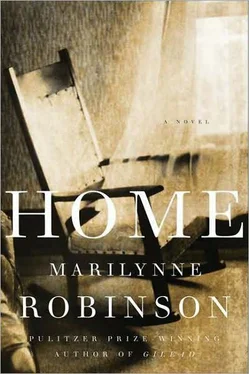THEN IT WAS SUNDAY AND JACK WENT TO CHURCH. THIS was to show Ames his respect and, he said, appreciation. He asked her for two dollars for the offering, since he had made her put all money away out of sight, and had even, despite their sentimental value, given her dollar bills he had hidden years before in the pages of the Edinburgh books, the proceeds of youthful thefts, which he had put where he knew no one would find them. Twelve dollars scattered through The Monstrous Regiment of Women and nineteen in On Affliction . From The Hind Unloos’d , which their father had told them to revere as a great work, he took a few desolate report cards and a note to his father from a civics teacher who saw only the darkest clouds on his moral and educational horizon and asked urgently for a conference. He shook his head. “I guess I was a pretty cynical kid,” he said, and laughed. Glory suggested he put the money in the collection plate as a sort of penance, but he thought the amount was large enough to arouse suspicion. “Coming from me it would be, anyway.”
She stayed with her father, who she thought had reacted to the news that Jack was at church with a brief and tentative cheerfulness. Jack came home as calm as he was when he left, to his father’s apparent relief, and when she asked him what the sermon was about, he laughed and said, “It wasn’t about me.” Then he said, “Well, it was about idolatry, about the worship of things, on one hand the material world, in the manner of scientific rationalism, and on the other hand — chairs and tables and old purple drapes, in the manner of Boughtons and totemists. It did cause me to reflect.”
“Don’t worry,” she said. “I won’t change a thing.”
“If you want to, feel free.”
“Of course.”
She made a beef roast and dinner rolls while Jack worked in the attic, clearing space for whatever in her hardness of heart she might decide to put out of sight. Again he was purposeful. The picture of the river was back in its old place, so she glanced through the open door of his room and saw the volumes of Kipling on his dresser between the Lincoln bookends. Nothing to be said, nothing to be done. Her father, who hardly spoke at all, watched their comings and goings with irritation and distrust. She served dinner in the kitchen, careful not to stir memories if she could avoid it. When they were seated and she had said the grace, her father sat impatiently with his hands folded in his lap until Jack offered to feed him his mashed potatoes and gravy. These last few days his gentleness had been especially striking to her, and why should it be? She had always known he could be gentle. She would tell the others in case they had forgotten, so that they would all hope someday to know him as well as she did. Then if he ever came to any of them he would be deeply and immediately welcome, however disreputable he might seem or be. Finally her father gestured at the meal she had made and said, “I guess this is goodbye.”
Jack said, “Not quite yet.”
The old man nodded. “Not yet,” he said bitterly. “Not yet.”
“Teddy will be here soon.”
“I’m sure of that.” His head fell. “With his stethoscope. As if that solved anything.”
Jack cleared his throat. “It’s been good to be home. It really has.”
The old man raised his eyes and studied his son’s face. “You’ve never had a name for me. Not one you’d call me to my face. Why is that?”
Jack shook his head. “I don’t know, myself. They all seemed wrong when I said them. I didn’t deserve to speak to you the way the others did.”
“Oh!” his father said, and he closed his eyes. “That was what I waited for. That was what I wanted.”
GLORY HAD DEVELOPED A NEW APPRECIATION FOR THE SABBATH because it was the day when no mail came. That Sunday had passed in sad tranquillity, her father a little stronger, she thought, and Jack full of solicitude for them both, regretful but not at all in doubt, embarrassed by his own undeviating will to be gone. Monday morning she heard him in his room, sorting through his dresser, putting aside, she was sure, everything of her father’s she had given him, to suit his strangely rigorous notions of what indeed belonged to him. She had never known another thief, so she could not generalize, but she thought thievishness might involve some subtle derangement of the sense of mine and thine. Some inability to find the bounds of scrupulousness. That would account for his refusal to leave the house with a pair or two of his father’s socks. The austerity of it all broke her heart. The handkerchiefs he had borrowed were washed and pressed and back in their father’s drawer. He was becoming once again the Jack who had turned up at the kitchen door claiming to have lost a suitcase.
No, there was that other thief, the one who had kept an account of the money she gave him, perhaps even believing he might pay her back. Time enough to think about children, he said, and she had nodded, knowing it wasn’t true. He needed a little money, a little more money, because he was going into business with an old army buddy of his. He couldn’t wait for the two of them to meet, she would love him — in a manner of speaking, ha ha. She gave him the money so he would stop talking, maybe even so he would go away. He might have known this. He would go away and leave her with her thoughts of him. Those few things it still moved her to remember, how he took her hand. Luke and Daniel and Faith had all been there in the parlor waiting, the day she brought him home. They were perfectly cordial, not visibly surprised. She was fairly sure nothing sardonic would have passed among them when she and the fiancé left the room. There was no hint that they had any particular doubts about his character or his intentions. Still, there was a flicker of nerves in the glance he gave her. Then he took her hand.
She was thinking about all this when the mail came. Letters to her from Luke and Hope and a letter to Jack from Della Miles. She went into the kitchen and sat down. She had become used to the idea that nothing more of consequence would happen after the last of the letters Jack had sent came back to him. But if the woman named Lorraine — Glory had addressed the envelope — telephoned Della and read Jack’s letter to her — no, this still would have arrived too quickly. It was sent from Memphis, not by air mail. She was light-headed. It is terrible that letters can matter so much. She thought of burning it. She even thought of opening it. Then she would burn it if need be. No, some things are sacred, even, especially, this wounding thing — wounding, how did she know that? She knew. She went to the stairs and called to Jack to come down, which he did very promptly. He would think she needed help with their father. When he saw her he said, “What’s the matter?”
“Nothing. This letter came for you.”
She had left it lying on the table. He picked it up and looked at it. “Jesus,” he said. “Sweet Jesus.”
“Would you like me to leave you alone?”
“Yes,” he said. “If you don’t mind. Thank you.”
So she went into the parlor and sat down next to the radio, and waited for any sign that she might be wanted or needed. There was only silence. Finally she went to the kitchen door. Jack looked up at her and smiled. He said, “It doesn’t really change anything.” He cleared his throat. “It isn’t unkind. I’m all right.” Then he said, “Cry if you want to, chum. Feel free.”
Glory sat there with him, ready to go away if he gave any sign that she should. From time to time he looked up at her, as if there were something he thought of saying and did not, or as if he knew she was of one mind with him though neither of them spoke. Finally he said, “I’m still planning to stay around until Teddy calls. I won’t be good for much.” And he said, “Anyone in the world would want a drink right now.” When they heard their father stir he went with her to tend to him. The old man blinked at Jack and said, “Now she’s crying. I don’t know what to do about it. Jesus never had to be old.” But he let them bathe him and dress him and shave him, and he let Glory brush his hair. Jack brought the Old Spice and touched it to his cheeks. They helped him to the parlor, to his Morris chair. Glory poached an egg, and Jack leaned in the door and watched while she fed him.
Читать дальше












